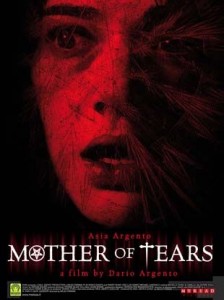 It took Dario Argento 30 years to complete his “Three Mothers†trilogy with the third film, “Mother of Tears.” It was through those years that the first feature, “Suspiria,†developed a reputation as one of the genre’s most effective films. His fan base considers that film the center of the Argento universe, although “Deep Red†(which exists outside of the “Three Mothers†system) gets as much praise and stands as a masterpiece on its own terms. That kind of acclaim comes at a price: For a director, there are few challenges as troubling as trying to top yourself.
It took Dario Argento 30 years to complete his “Three Mothers†trilogy with the third film, “Mother of Tears.” It was through those years that the first feature, “Suspiria,†developed a reputation as one of the genre’s most effective films. His fan base considers that film the center of the Argento universe, although “Deep Red†(which exists outside of the “Three Mothers†system) gets as much praise and stands as a masterpiece on its own terms. That kind of acclaim comes at a price: For a director, there are few challenges as troubling as trying to top yourself.
Like most Argento movies, “Mother of Tears†is an incredibly violent film with murders so extreme that they approach parody. In his better movies, Argento finds an art to killing his darlings in the bloodiest and most bizarre manner possible, and supports these moments with atmosphere and composition. This one’s got his style but not his touch, and the whole thing feels brainless and impotent. The funny thing is: Argento’s trilogy is complete, but something seems to be missing from the film itself, or the sensibility that inspired it.
The setup involves Sarah (Asia Argento), an American girl studying art history in Rome. When an old urn is unearthed and sent to her university for research, Sarah and an associate inspect it, which leads to the revival of some ancient demons who kill her while Sarah flees. Disturbing the urn, we learn, has set a series of events into motion that creates chaos in Rome: The Mother of Tears (Moran Atias), who adores misery, puts a spell (or something) on everybody in the city that drives them into fits of random death and violence.
Eventually, Sarah learns that she’s the daughter of a different witch (Daria Nicolodi), whose skill in white magic gave her great powers before she died. Since these powers are hereditary, Sarah has what she needs to challenge the Mother of Tears.
Between the center-stage gore and unmotivated dialogue, the film gets lots of bad laughs. There is suspense, but it’s empty half the time. Consider the scene where Sarah visits an alchemist (Philippe Leroy): He captures her, sends an acolyte to force her eye wide open, examines it and lets her go. Afterward, he tells her that it was all a test, and that he had to be sure of her intentions before he could help her. Meaningless.
Argento missed the mark on this one, but its promoters are sly enough to make up for it. The cover for the DVD includes a quote from The Village Voice, which refers to it as “an instant cult classic.†That claim doesn’t appear in the real review by Jim Ridley, which reads: “Without Argento’s once-trademark elegance, all that’s left is poorly staged, protracted sadism interrupted by expository narcolepsy and unintended horselaughs.â€
Ridley goes on to say that “it’s painful to watch the Hieronymus Bosch of ‘70s horror sink this low.†Surely he knew that even gifted minds lose their way from time to time? Oscar Wilde knew it, as demonstrated by his famous review of “The Old Curiosity Shop†by Charles Dickens: “One must have a heart of stone to read the death of Little Nell without laughing.†When it comes to “Mother of Tears,†substitute “see†for “read†and “an associate†for “Little Nell,†and you’ve pretty much got it.

Leave a Reply